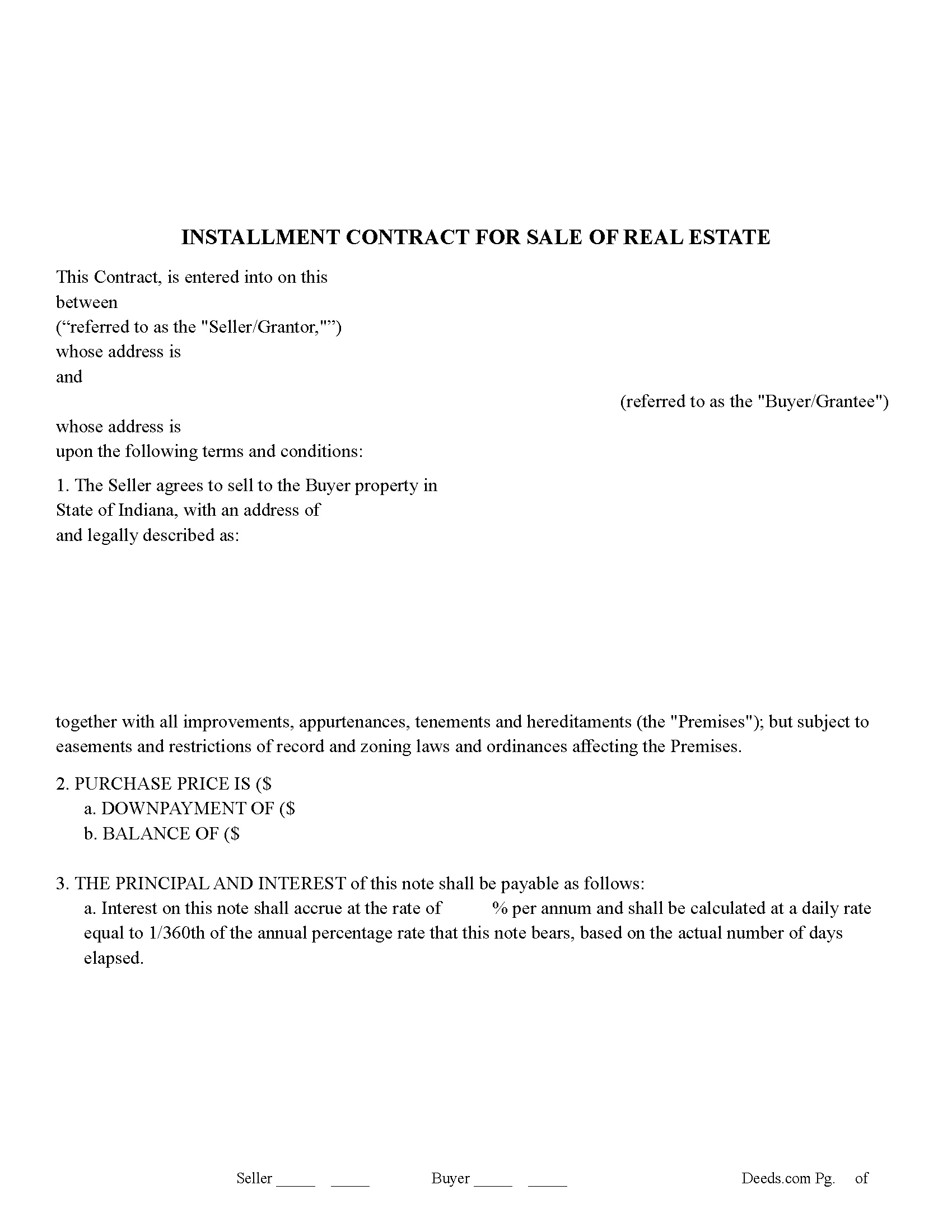Download Indiana Installment Contract for Sale of Real Estate Legal Forms

Indiana Installment Contract for Sale of Real Estate Overview

An "Installment Contract for Sale of Real Estate", also known as a Contract for Deed, Land Contract, or Contract for Sale) is a legal agreement/contract where the buyer makes payments directly to the seller in exchange for the right to use the property. The buyer receives the deed and full ownership of the property only after all payments have been made.
A land contract form can be used in Indiana when both the buyer and seller agree to an installment sale of real property, where the buyer makes payments directly to the seller over time, rather than obtaining a traditional mortgage from a bank. The seller retains the legal title to the property until the full purchase price is paid, at which point the title is transferred to the buyer. Here are some common scenarios where an INSTALLMENT CONTRACT FOR SALE OF REAL ESTATE might be used:
1. Buyer Lacks Access to Traditional Financing
Credit Challenges: The buyer may have difficulty qualifying for a traditional mortgage due to poor credit, insufficient credit history, or other financial issues.
Income Verification: The buyer may be self-employed or have income that is difficult to verify, making it harder to secure a conventional loan.
2. Seller Financing Preferences - Investment Strategy: The seller may prefer to finance the sale as an investment, earning interest over time instead of receiving the full purchase price upfront. Speed of Sale, a land contract can be an attractive option in a slow market, enabling the seller to reach a deal with a buyer who might not qualify for a traditional mortgage.
3. Flexible Terms - Custom Payment Arrangements: The buyer and seller can negotiate terms that suit their needs, such as the payment schedule, interest rate, down payment, and the duration of the contract. Possession Before Full Payment: The buyer can take possession of the property and start using it while making payments, even if they cannot pay the full purchase price upfront.
4. Buyer's Intent to Improve Property -Rehabilitation Projects: The buyer may intend to rehabilitate or improve the property before obtaining full financing. A land contract allows them to take possession and make improvements before completing the purchase.
5. Simplified Process - Reduced Costs: A land contract may reduce the costs associated with closing, as it often bypasses the need for a traditional lender and related fees.
Faster Execution: The process of negotiating and executing a land contract can be faster than obtaining a traditional mortgage.
6. Unique Property - Non-Conforming Properties: For properties that may not meet the standards required by traditional mortgage lenders (such as rural, unique, or non-conforming properties), a land contract can be a viable option.
7. Inter-Family Transactions - Family Agreements: A land contract can be useful in family transactions where a parent is selling a home to a child or another relative, offering a flexible payment arrangement that suits both parties.
Procedures for Using a Contract for Deed
1. Drafting the Contract:
The contract must include all essential terms: purchase price, payment schedule, interest rate, penalties for default, responsibilities for taxes and insurance, and the date when the deed will be transferred.
2. Indiana Code § 32-21-7 - Land Contracts
This statute outlines the requirements and procedures for recording land contracts. It requires that the contract be recorded in the recorder's office in the county where the property is located within 45 days after the contract is executed. The purpose of recording is to provide notice to third parties, thereby protecting the buyer's interest in the property.
Failure to record the contract can affect the enforceability of the buyer’s interest against third parties.
3. Payment and Maintenance:
The buyer makes monthly installment payments to the seller, who retains legal title until the contract is fully paid. (This contract allows for a Balloon payment). The buyer takes on responsibilities such as property taxes, insurance, and maintenance.
Terms and uses
1. TITLE AND TITLE INSURANCE. Seller shall provide Buyer with a standard form owner’s policy of title insurance in the amount of the purchase price. The title policy to be issued shall contain no exceptions other than those provided in said standard form plus encumbrances or defects approved by Buyer as provided below. As soon as reasonably possible after escrow is opened Buyer shall be furnished with a preliminary commitment. Said preliminary commitment shall include legible copies of all documents forming the basis for any special exception set forth. If Buyer chooses an extended owner’s policy, Buyer shall pay the difference in cost between the standard owner policy, and the extended owner’s policy.
2. DEED Of CONVEYANCE. Upon receipt of Buyer's payment in full of the balance of the purchase price, Seller shall furnish a General Warranty Deed, conveying to Buyer title to the property.
3. LATE CHARGE: Any above noted payment which is at least days past due, shall be subject to a late charge of $ And an additional $ per day until the payment is received. If any balloon payment is late, it shall be subject to a late fee of $ per day.
4. Uses include residential property, rental property up to 4 units, condominiums, and planned unit developments. Traditional installment payment with or without a balloon payment.
A contract for sale with stringent default terms can be beneficial to the seller.